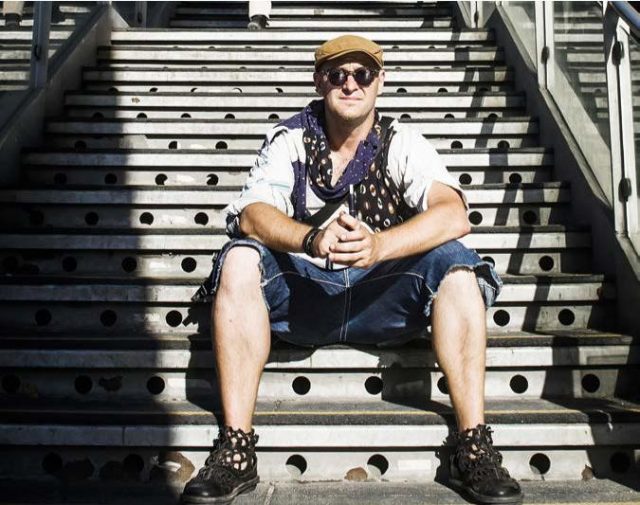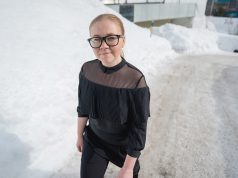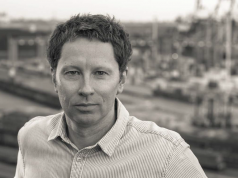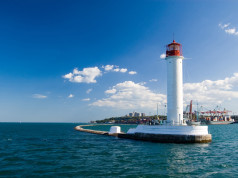The expert guide to Jewish Ukraine says it’s not the sites that are important, but how we reflect on them.
If you want to learn about the Jewish history of Ukraine, there are few better people to have at your side than Ze’ev Volkov. Born in Odessa, Volkov has lived for twenty years in Israel. However, since 2011, he has worked as a tour guide to the Jewish history of Kyiv, Odessa, Tel Aviv, and even New York. He leads tours in both Russian and Hebrew, and, today, he even trains Ukrainian guides to better understand their country’s Jewish history.
Just don’t ask Volkov what sights to see in Kyiv or Odessa. He won’t tell you.
It’s not that he doesn’t know. Rather, it contradicts his philosophy of tourism and his professional approach. To Volkov, visiting a monument to Russian revolutionary Vladimir Lenin or Ukrainian national poet Taras Shevchenko can be just as important — if not more so — than seeing more obvious sites, like a historic synagogue.
On the surface, his reason for this is straight-forward. But it also represents a break-through in the “place, date” and “look to your left, look to your right” world of guided tours. The purpose of Jewish tourism in Ukraine is not simply to lay your eyes on a relic of Jewish civilization or to take a picture of the Shalom Aleichem monument, Volkov believes. Rather, it is to reflect on the Jewish story.
“The whole city is a theater, and you need to put on a play”, Volkov says. Wherever he takes tourists, the goal is to use that site “to explain who the Jewish people are and what is unique about the Jewish world in this place”.
In Volkov’s tours, the pedestal of the old Lenin monument — toppled in December 2013, during the Euromaidan protests — is an opportunity to discuss the Soviet leader’s writings on the “Jewish question” and whether he had Jewish ancestry. The Taras Shevchenko statue and its park serve as a moment to reflect upon the poet’s complicated relationship with the Jews.
A memorial plaque to Janusz Korczak, erected near Kyiv’s Zoloti Vorota metro station last year, is a “direct line between Kyiv and the Yad Vashem [Holocaust] museum in Jerusalem”, Volkov explains. A Polish-Jewish doctor, writer, and educator who ran an orphanage in Warsaw, Korczak is famous for choosing to go to the Treblinka death camp with his orphans rather than save his own life. Fewer people, however, realize that Korczak lived in Kyiv during World War I and wrote one of his most important works there.
Even memorials and sites directly connected to Ukrainian-Jewish history can serve as places for broader reflection. Babyn Yar — the ravine on the outskirts of Kyiv where Nazi troops and Ukrainian collaborators slaughtered more than 100 thousand people, including 30 thousand Jews — is a somber site in Jewish historical memory. After the Second World War, the Soviet Union deemphasized the Nazi atrocity against Jews at Babyn Yar, presenting it instead as a crime against the Soviet people.
To Volkov, that story — what came after — is also important. And Babyn Yar is a place to discuss how attitudes toward the massacre and understandings of the tragedy have changed in the course of the 20th and 21st centuries.
It is this complicated history that led Volkov to begin offering Jewish history tours of Ukraine for Ukrainian tour guides. Because many people lacked knowledge of Jewish history, myths had begun to appear about Jews and their culture. Volkov works to dispel them. He wants Ukrainian guides to recognize that the Jewish people are not homogenous and to understand their diversity.
These tours have taken Volkov and the guides across Ukraine. But the program is not purely based upon excursions. Each guide who participates has the chance to ask questions — and not just about the sites they visit, but also about Jewish history, Jewish culture, and Ukrainian-Jewish relations. This questioning, discussion, and reflection is important not just for the guides’ professional development, but also for Ukraine as a whole.
“Ukraine is currently constructing its ethnic history and it sometimes contradicts Jewish history”, Volkov explains. “It’s important to understand that these issues are not closed. They are developing today. So we consider how [Ukrainian-Jewish] relations could be and how a guide can work with visitors who have questions about Jewish history”.
He lists off a number of challenging topics that can arise both when foreign visitors come to Ukraine and when Ukrainians go on tours in their own country: Jews in the 1917 Revolution, the WWII-era Ukrainian nationalist movement and its relations with Jews, Jewish nationalism and its encounters with Ukrainians.
Central to Volkov’s approach is the idea that working as a tour guide is a process of constant self-education. He notes that as he teaches Ukrainian guides Jewish history, he continues to learn himself from local historians.
“Everything you study helps you on the job”, he says. Reading works of literature, studying history, following the latest news — they all find their application in the work of a tour guide. Every tour guide may know the same facts, but each brings his or her own history and views to every site.
“One can discuss the meaning of God. Another will explain how people extracted water at this place. And another will tell you about the interethnic relations surrounding this site”, he explains.
Volkov does not limit himself to explaining Jewish Ukraine to tourists and their guides. He also helped to organize the festival “Odessa – Tel Aviv”, held in Tel Aviv earlier this month. The city of Odessa has exerted a major influence on Israeli culture. Revisionist Zionist leader Ze’ev Jabotinsky, Hebrew-language poet Hayim Nahman Bialik, and essayist and Zionist thinker Ahad Ha’am all lived and worked in Odessa. Tel Aviv’s first mayor, Meir Dizengoff, also lived in the “Pearl of the Black Sea”.
For these and other reasons, the festival’s young organizers decided it was important to understand Odessa’s influence on Tel Aviv. Volkov took them to Odessa to help them study the city. Then, they organized the festival.
The results, Volkov says, were unusual and very interesting. “Odessa – Tel Aviv” included unexpected events like old-fashioned cantorial singing electronically edited and played in the Tel Aviv planetarium. The Odessa Museum of Modern Art sent several works of art to the festival. Volkov gave a lecture on Odessa Zionism and its influence on Tel Aviv. And LGBT activist Anna Talisman — herself a former resident of Odessa — lectured on “the feminization of Odessa”. The attendees were plentiful and most left satisfied, Volkov says.
But for all his experience with Jewish tourism in Ukraine and explaining the Jewish world to Ukrainians, Volkov is hesitant to give specific advice on how to tour Ukraine from the point-of-view of Jewish history. His approach to tourism — reflective, open, discussion-based — is ideologically unsuited to direct questions of where to go and what to see. And more importantly, his view of sightseeing and history differs sharply from that of the average tourist.
“Go to Lviv, Odessa, Kyiv, Chernivtsi”, he recommends. Much of modern tourism is focused on “unique” experiences — going somewhere strange or doing something unexpected. “But how can you experience something unique when you don’t even understand the foundation?” he asks.
On the second or third visit you can go deeper. But the first time, you will hardly understand the foundation of what makes cities like Kyiv and Odessa unique places, he says. That’s why it’s important for first-time visitors to “do their homework” and find a good guide who can open Ukraine for them.
That may be discouraging advice for backpackers and do-it-yourself tourists, but it should not be an obstacle. Right now, prices in Ukraine are low and the number of talented guides is quite high. And the possibilities are endless.
“Thankfully, Ukraine has so many interesting Jewish artifacts”, Volkov says. “Every month or two we find out about new ones”.
Matthew Kupfer is Senior Editor of The Odessa Review.




































